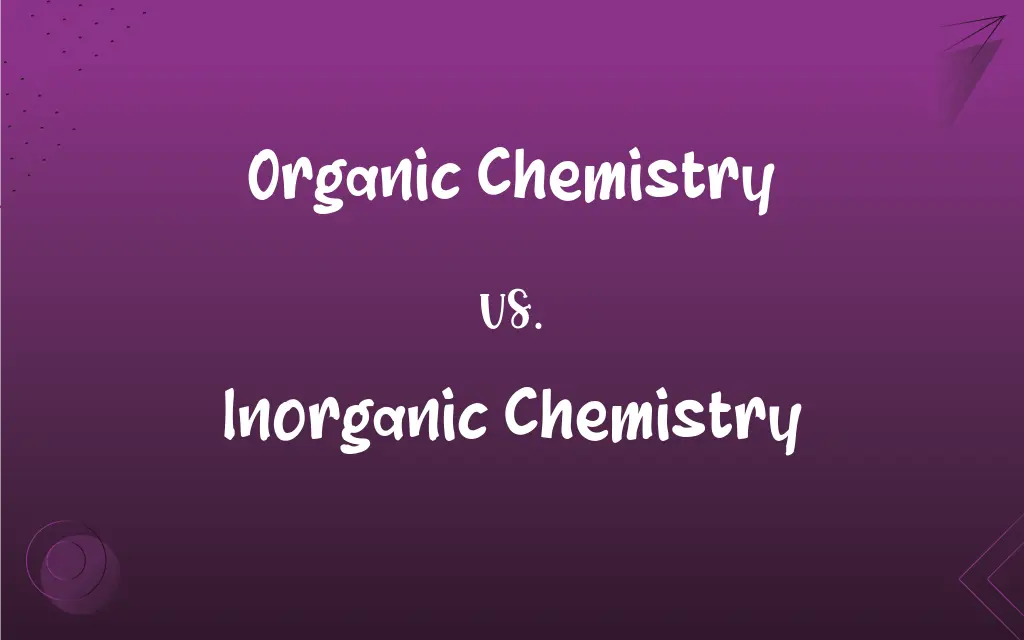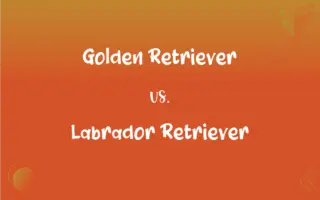Organic Chemistry vs. Inorganic Chemistry: What's the Difference?
Edited by Aimie Carlson || By Janet White || Published on February 23, 2024
Organic chemistry is the study of carbon-containing compounds, while inorganic chemistry deals with compounds that do not contain carbon-hydrogen bonds.

Key Differences
Organic chemistry primarily focuses on compounds that contain carbon and hydrogen. These compounds may also include other elements like oxygen, nitrogen, sulfur, and halogens. In contrast, inorganic chemistry deals with compounds that do not have a carbon-hydrogen bond, typically involving metals and non-metals.
The study of organic chemistry encompasses a vast array of compounds, including hydrocarbons and their derivatives. Organic chemists study the structure, properties, composition, reactions, and synthesis of these carbon-based compounds. Inorganic chemistry, however, is concerned with materials like minerals, metals, and metalloids, and encompasses a broader range of substances than organic chemistry.
Organic compounds are often associated with living organisms or products derived from them, such as proteins, enzymes, and fossil fuels. Inorganic chemistry, on the other hand, involves substances that are generally not part of living systems, like salts, metals, and minerals.
Organic chemistry often involves the study of complex molecules with long chains and rings, intricate bonding, and multiple functional groups. Inorganic chemistry frequently deals with simpler structures, though it also covers complex coordination compounds with metal atoms.
The methodologies and techniques used in organic chemistry are often specific to the types of bonds and reactions common to carbon-containing compounds. Inorganic chemistry utilizes a different set of techniques, often focusing on ionic and covalent bonding and the properties related to these bonds.
ADVERTISEMENT
Comparison Chart
Definition
Study of carbon-containing compounds.
Study of non-carbon-based compounds.
Focus
Carbon and hydrogen compounds.
Metals, minerals, and other non-organic compounds.
Associated with
Living organisms and their derivatives.
Substances not typically found in living systems.
Molecular Complexity
Complex molecules with long chains and rings.
Simpler structures, includes complex coordination compounds.
Methodologies and Techniques
Specific to carbon bonds and reactions.
Focuses on ionic, covalent bonding and properties.
ADVERTISEMENT
Organic Chemistry and Inorganic Chemistry Definitions
Organic Chemistry
Involves compounds primarily made of carbon and hydrogen.
The synthesis of pharmaceutical drugs is a part of organic chemistry.
Inorganic Chemistry
Study of non-carbon-based compounds.
Analyzing the properties of minerals is part of inorganic chemistry.
Organic Chemistry
Deals with complex molecular structures and reactions.
Researching photosynthesis in plants is a study within organic chemistry.
Inorganic Chemistry
Focuses on compounds mainly composed of elements other than carbon.
The study of metal alloys falls under inorganic chemistry.
Organic Chemistry
Focuses on the chemical reactions of organic substances.
Examining the fermentation process in brewing beer involves organic chemistry.
Inorganic Chemistry
Deals with a wide range of substances not covered in organic chemistry.
Examining the properties of semiconductors involves inorganic chemistry.
Organic Chemistry
Study of carbon-based compounds.
Analyzing the structure of DNA falls under organic chemistry.
Inorganic Chemistry
Includes the chemistry of metals, salts, and minerals.
Investigating the structure of crystal lattices is a task in inorganic chemistry.
Organic Chemistry
Includes the study of natural and synthetic carbon compounds.
Creating synthetic polymers like plastics is a task for organic chemistry.
Inorganic Chemistry
Often involves simpler structures but also complex coordination chemistry.
Research in catalysts for industrial processes is part of inorganic chemistry.
FAQs
Can inorganic chemistry involve complex molecules?
Yes, while it often deals with simpler structures, it also includes complex coordination compounds.
Are living organisms studied in organic chemistry?
Yes, organic chemistry often involves studying compounds found in or produced by living organisms.
What types of compounds does inorganic chemistry cover?
Inorganic chemistry covers compounds that do not contain carbon-hydrogen bonds, like metals and salts.
What is the main focus of organic chemistry?
Organic chemistry focuses on the study of carbon-containing compounds.
Is the study of DNA considered organic chemistry?
Yes, DNA, being a carbon-based molecule, is studied in organic chemistry.
What distinguishes organic from inorganic compounds?
The presence of carbon-hydrogen bonds typically distinguishes organic from inorganic compounds.
Are metals and minerals part of inorganic chemistry?
Yes, inorganic chemistry extensively studies metals, minerals, and other non-organic compounds.
How are hydrocarbons classified in chemistry?
Hydrocarbons, composed of carbon and hydrogen, are studied under organic chemistry.
Can inorganic chemistry help in renewable energy research?
Yes, inorganic chemistry plays a role in renewable energy, particularly in solar cell.
What role does organic chemistry play in medicine?
Organic chemistry is crucial in the development and synthesis of pharmaceutical drugs.
Are enzymes studied in organic chemistry?
Yes, enzymes, which are organic molecules, are studied in organic chemistry.
Are salts and acids part of inorganic chemistry?
Yes, salts, acids, and bases are typically studied in inorganic chemistry.
Do inorganic chemists study crystal structures?
Yes, inorganic chemists often analyze the structure of crystals and minerals.
Can inorganic chemistry include the study of gases?
Yes, inorganic chemistry includes the study of inorganic gases like nitrogen and oxygen compounds.
Does inorganic chemistry contribute to electronics?
Yes, inorganic chemistry contributes significantly to the electronics industry, especially in semiconductor research.
How important is inorganic chemistry in industry?
Inorganic chemistry is vital in industries for producing materials like metals, ceramics, and catalysts.
Are synthetic materials like plastics part of organic chemistry?
Yes, synthetic carbon-containing materials like plastics are a part of organic chemistry.
How is organic chemistry used in food science?
Organic chemistry is used in food science to study food components like carbohydrates, fats, and proteins.
Is organic chemistry related to environmental studies?
Yes, organic chemistry is relevant in studying environmental factors like pollution and biodegradation.
What role does organic chemistry play in agriculture?
Organic chemistry is crucial in agriculture, especially in the synthesis of pesticides and fertilizers.
About Author
Written by
Janet WhiteJanet White has been an esteemed writer and blogger for Difference Wiki. Holding a Master's degree in Science and Medical Journalism from the prestigious Boston University, she has consistently demonstrated her expertise and passion for her field. When she's not immersed in her work, Janet relishes her time exercising, delving into a good book, and cherishing moments with friends and family.
Edited by
Aimie CarlsonAimie Carlson, holding a master's degree in English literature, is a fervent English language enthusiast. She lends her writing talents to Difference Wiki, a prominent website that specializes in comparisons, offering readers insightful analyses that both captivate and inform.







































































